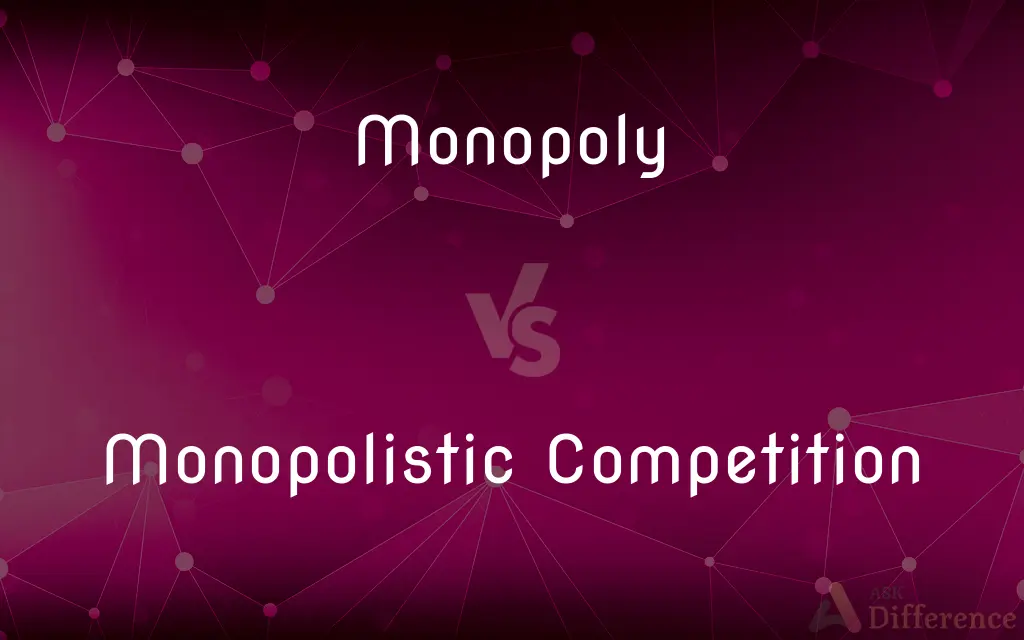Monopoly vs. Monopolistic Competition — What's the Difference?
By Tayyaba Rehman — Published on October 20, 2023
Monopoly is a market with one seller controlling all production, while Monopolistic Competition has many sellers offering differentiated products.

Difference Between Monopoly and Monopolistic Competition
Table of Contents
ADVERTISEMENT
Key Differences
Monopoly and Monopolistic Competition are two distinct market structures that exhibit unique characteristics. In a Monopoly, there is only one firm that dominates the entire market, and it sets the price of the product or service. This firm faces no competition, and consumers have no choice but to purchase from this single provider. In contrast, Monopolistic Competition involves several firms that compete against each other. However, the products they offer are not perfect substitutes; they are differentiated in some way.
While a Monopoly enjoys the luxury of being the sole provider and has significant market power, it also bears the burden of meeting the entire market's demand. In a Monopolistic Competition, firms have some degree of market power because of the differentiated nature of their products, allowing them to set prices to an extent. However, they also face competition from other firms in the market, which can influence pricing and market share.
It's crucial to note the consumer's perspective in these two market structures. In a Monopoly, the consumer has no alternatives available and is subject to the price set by the monopolist. In Monopolistic Competition, consumers can choose between various products, each with its unique attributes, and prices may vary based on these differentiations.
Another important distinction is the barriers to entry. In a Monopoly, barriers to entry are typically high, preventing other firms from entering the market. In contrast, Monopolistic Competition usually has low barriers to entry, which means new firms can enter the market and compete, further diversifying product offerings.
Comparison Chart
Number of Firms
Single firm dominates.
Many firms compete.
ADVERTISEMENT
Product Differentiation
No differentiation; one product.
Products are differentiated.
Pricing Power
Significant pricing power; sets price.
Some pricing power due to product differentiation.
Consumer Choice
No choice; one provider.
Choice among differentiated products.
Barriers to Entry
Typically high barriers.
Lower barriers compared to monopoly.
Compare with Definitions
Monopoly
Exclusive control over a product or service.
The tech giant maintained its Monopoly over the software market.
Monopolistic Competition
Numerous firms with distinct product offerings.
Fashion brands operate under Monopolistic Competition, each showcasing unique styles.
Monopoly
Sole provider in a market without competition.
Having a Monopoly, the firm set high prices without opposition.
Monopolistic Competition
Competition among differentiated product sellers.
Local bakeries engage in Monopolistic Competition, each boasting its special recipes.
Monopoly
Complete command over a market sector.
The diamond company's Monopoly was evident by its vast market share.
Monopolistic Competition
Market where products are similar but not perfect substitutes.
In Monopolistic Competition, a consumer's loyalty to a brand might be based on minor product differences.
Monopoly
A market dominated by a single seller.
The electric company has a Monopoly in the city.
Monopolistic Competition
Market with many sellers offering differentiated products.
In the coffee shop industry, Monopolistic Competition leads to various flavors and branding.
Monopoly
One firm's dominance over an entire market.
The board game industry saw a Monopoly emerge during the decade.
Monopolistic Competition
Firms compete with non-identical products.
The smartphone market is characterized by Monopolistic Competition, with each brand having unique features.
Monopoly
Exclusive control by one group of the means of producing or selling a commodity or service
"Monopoly frequently ... arises from government support or from collusive agreements among individuals" (Milton Friedman).
Monopoly
A company, group, or individual having exclusive control over a commercial activity.
Monopoly
A commodity or service so controlled.
Monopoly
Exclusive possession or control
Arrogantly claims to have a monopoly on the truth.
Monopoly
Something that is exclusively possessed or controlled
Showed that scientific achievement is not a male monopoly.
Monopoly
A situation, by legal privilege or other agreement, in which solely one party (company, cartel etc.) exclusively provides a particular product or service, dominating that market and generally exerting powerful control over it.
Monopoly
An exclusive control over the trade or production of a commodity or service through exclusive possession.
A land monopoly renders its holder(s) nearly almighty in an agricultural society.
Monopoly
The privilege granting the exclusive right to exert such control.
Granting monopolies in concession constitutes a market-conform alternative to taxation for the state, while the crown sometimes bestowed a monopoly as an outrageous gift.
Monopoly
(metonymy) The market thus controlled.
Monopoly
(metonymy) The holder (person, company or other) of such market domination in one of the above manners.
Monopoly
Exclusive possession; as, a monopoly of land.
If I had a monopoly out, they would have part on 't.
Monopoly
The commodity or other material thing to which the monopoly relates; as, tobacco is a monopoly in France.
Monopoly
(economics) a market in which there are many buyers but only one seller;
A monopoly on silver
When you have a monopoly you can ask any price you like
Monopoly
Exclusive control or possession of something;
They have no monopoly on intelligence
Monopoly
A board game in which players try to gain a monopoly on real estate as pieces advance around the board according to the throw of a die
Common Curiosities
What is the primary feature of a Monopoly?
The primary feature of a Monopoly is that a single firm dominates and controls the entire market.
How do products differ in Monopolistic Competition?
In Monopolistic Competition, products are differentiated by branding, quality, features, or other attributes, making them non-perfect substitutes.
Why do firms in Monopolistic Competition have some pricing power?
They have pricing power due to product differentiation, allowing them to set prices based on unique product attributes.
Can new firms easily enter a market in Monopoly?
No, in a Monopoly, there are typically high barriers to entry, preventing new firms from entering.
Is consumer choice limited in a Monopoly?
Yes, in a Monopoly, consumers have no choice as there's only one provider offering the product or service.
Can a Monopoly lead to higher prices for consumers?
Yes, since a monopolist faces no competition, it can set prices higher than in competitive markets.
Do firms in Monopolistic Competition produce identical products?
No, they produce differentiated products that are not perfect substitutes.
Can Monopolies be regulated by governments?
Yes, many governments regulate or break up Monopolies to promote competition and protect consumers.
How does consumer choice differ in Monopolistic Competition?
In Monopolistic Competition, consumers have choices among various differentiated products.
What leads to Monopolistic Competition in a market?
Factors like branding, product quality, and unique features lead to Monopolistic Competition, differentiating products from one another.
Why might firms in Monopolistic Competition engage in heavy advertising?
Advertising can further differentiate their product and gain a competitive edge in the market.
Do Monopolies have any advantages?
Yes, Monopolies can benefit from economies of scale and may invest more in research and development due to guaranteed market share.
Can Monopolistic Competition lead to inefficiencies?
Yes, some argue that it can lead to excess capacity or non-optimal production levels due to competition among many firms.
Why might Monopolistic Competition benefit consumers?
It offers variety, product differentiation, and competitive prices due to the presence of multiple competing firms.
Are Monopolies always bad for the economy?
Not necessarily. While they can restrict competition, they can also bring about economies of scale and stability in some sectors.
Share Your Discovery

Previous Comparison
Savings vs. Investment
Next Comparison
Saprotrophs vs. SaprophytesAuthor Spotlight
Written by
Tayyaba RehmanTayyaba Rehman is a distinguished writer, currently serving as a primary contributor to askdifference.com. As a researcher in semantics and etymology, Tayyaba's passion for the complexity of languages and their distinctions has found a perfect home on the platform. Tayyaba delves into the intricacies of language, distinguishing between commonly confused words and phrases, thereby providing clarity for readers worldwide.
















































